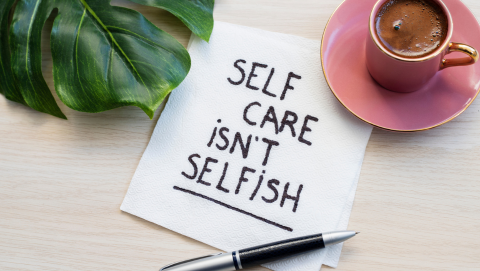Bite-sized Strategies to Make Time for Mental Health
By Emma Parkhurst, Extension Assistant Professor
If there is one thing the past few years has taught us, it is that we should be taking more time to focus on our mental health and wellbeing, in other words, self-care. But for many, that is easier said than done. According to Mental Health America, one study shows that people only spend an average of 15 minutes a day on health-related self-care. Whether it is a lack of time, not knowing how to get started, or it just adds one more thing to do to our already busy lives, it can be easy to sweep self-care under the rug. But when we engage in self-care, our mental health and overall wellbeing flourish and in turn can have a positive influence on the mental health of others around us.
There is a common comparison used in the health and wellness world when it comes to self-care: think of it like the safety instructions given on an airplane. We are told to put our own oxygen mask on first before we help others. The Substance Abuse and Mental Health Services Administration (SAMHSA) encourages us to use the same mindset in terms of taking care of our own needs: it is necessary to make self-care a priority to be able to also take care of others and lead a fulfilling life. So how can we get started? Even the smallest act of self-care can have a positive effect, the key is to find what works for your lifestyle and interests. Here are a few bite-sized strategies to start prioritizing your mental health and self-care today:
- Go outside: whether you spend time in a park or simply step outside the door wherever you are, research shows that being outside can increase energy levels, reduce depression, and boost well-being.
- Spend 5 minutes on a hobby: engaging in activities you enjoy, aka a hobby, can reduce stress, enhance well-being, improve social connection, and decrease depression and anxiety.
- Deep breaths: while mindfulness techniques like guided meditations can positively influence mental health, even just taking deep breaths for a few minutes a day can make a big difference. By taking deep breaths, your brain releases a “feel good” chemical, endorphins, and helps to reduce stress.
Prioritizing our mental health and self-care doesn’t have to be complicated or time consuming. Starting with small positive changes can lead to the many benefits associated with taking time to focus on self-care. Think about what your daily routine looks like and see if you can find an extra 5 minutes to dedicate to a self-care strategy, even something as simple as connecting with a friend or going to sleep earlier. For more ideas, visit Mental Health America’s list of tips to boost your mental health.
References:
Caring for Your Mental Health. (2024, February). National Institute of Mental Health. https://www.nimh.nih.gov/health/topics/caring-for-your-mental-health
Mental Health Awareness Month is a Time for Self-Care. (2023, April 26). Substance Abuse and Mental Health Services Administration. https://www.samhsa.gov/blog/mental-health-awareness-month-time-self-care


 Utah 4-H & Youth
Utah 4-H & Youth